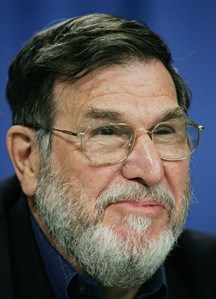
Gar Pardy, in Ottawa, June 2, 2005 at the Maher Arar Inquiry. THE CANADIAN PRESS/Jonathan Hayward
July 19, 2012 - 12:37 PM
TORONTO - The Harper government's foot-dragging on the return of Omar Khadr from Guantanamo Bay is unprecedented in light of the commitment it gave the United States that it would accept his transfer to Canada, a former diplomat says.
Gar Pardy, who spent more than three decades with Canada's foreign service, said it was on the basis of that commitment that Khadr pleaded guilty before a widely maligned U.S. military commission to war crimes committed as a 15 year old.
"It's more than extraordinary, it's unprecedented," Pardy said of Ottawa's inaction.
"I don't think there's any enthusiasm by any of the people in the Canadian government to see him come back to Canada — they're trying to drag it out in every way possible."
Pardy, who retired in 2003, is one of four people swearing affidavits in support of a new application by Khadr's lawyers asking Federal Court to order Public Safety Minister Vic Toews to make a decision on the file.
Under his October 2010 plea deal, Khadr, 25, became eligible to transfer to a Canadian prison last fall. Toews, however, has steadfastly refused to authorize the transfer, saying Khadr's potential threat to Canadians needs to be evaluated.
In their application, which they hope will be heard quickly, Khadr's Canadian lawyers — they have been in Guantanamo Bay this week briefing him on the application — call the delay "unreasonable."
"The minister has breached the principles of natural justice and deprived the applicant of procedural fairness," their application states.
"The minister's delay in rendering a decision ... is an abuse of process."
It was almost exactly 10 years ago that U.S. soldiers found a gravely wounded and barely alive teenaged Khadr in the rubble of a bombed-out compound in Afghanistan following a four-hour firefight that left an American special forces soldier dead.
In his plea deal, the Toronto-born Khadr admitted to throwing a hand grenade that killed the soldier. He was convicted of five war crimes, including murder in violation of the laws of war — a crime not recognized outside of the U.S. military commissions.
One of Khadr's former lawyers has questioned whether Khadr even understood what he was signing when he agreed to the plea deal.
The case has polarized Canadian public opinion, with supporters arguing he was a child soldier convicted in a kangaroo court while detractors claim him to be a dangerous terrorist.
The split can be seen in duelling online petitions currently doing the rounds.
One by former general Sen. Romeo Dallaire demanding Khadr's return was closing in on 20,000 signatures within a week.
Another, by a resident of the east-end Toronto neighbourhood where Khadr's family lives, wants him kept out on the basis that he would be a "role model" for other Canadian jihadists. It has picked up almost 4,000 signatures in three months.
Pardy said anti-Khadr hysteria is playing into Toews' hands and is "probably being exploited or used by the government."
Most observers, including his guards and others who have dealt with him in Guantanamo, say Khadr is not radicalized and simply wants to get on with his life.
Senior military-commission officials have grumbled that Ottawa's failure to facilitate the transfer of the last westerner — approved in April by Washington — has made it difficult to strike plea deals with other Guantanamo Bay prisoners.
At the same time, Pardy said, it's unlikely the Obama government would be pressing Canada to act quickly because of its reluctance to raise Guantanamo issues during an election year.
Recent amendments to the treaty governing the international transfer of prisoners gives Toews almost unlimited discretion to decide Khadr's fate, including the possibility of refusing to accept him until he has served out his sentence.
"I don't see Mr. Toews being overrun with the milk of human kindness on these kinds of cases, that's for sure," Pardy said.
Should Khadr serve out the entire eight-year sentence he was given in exchange for his guilty pleas — only one of which was to be served in Guantanamo — he would be able to return to Canada without any strings attached given his Canadian citizenship.
News from © The Canadian Press, 2012